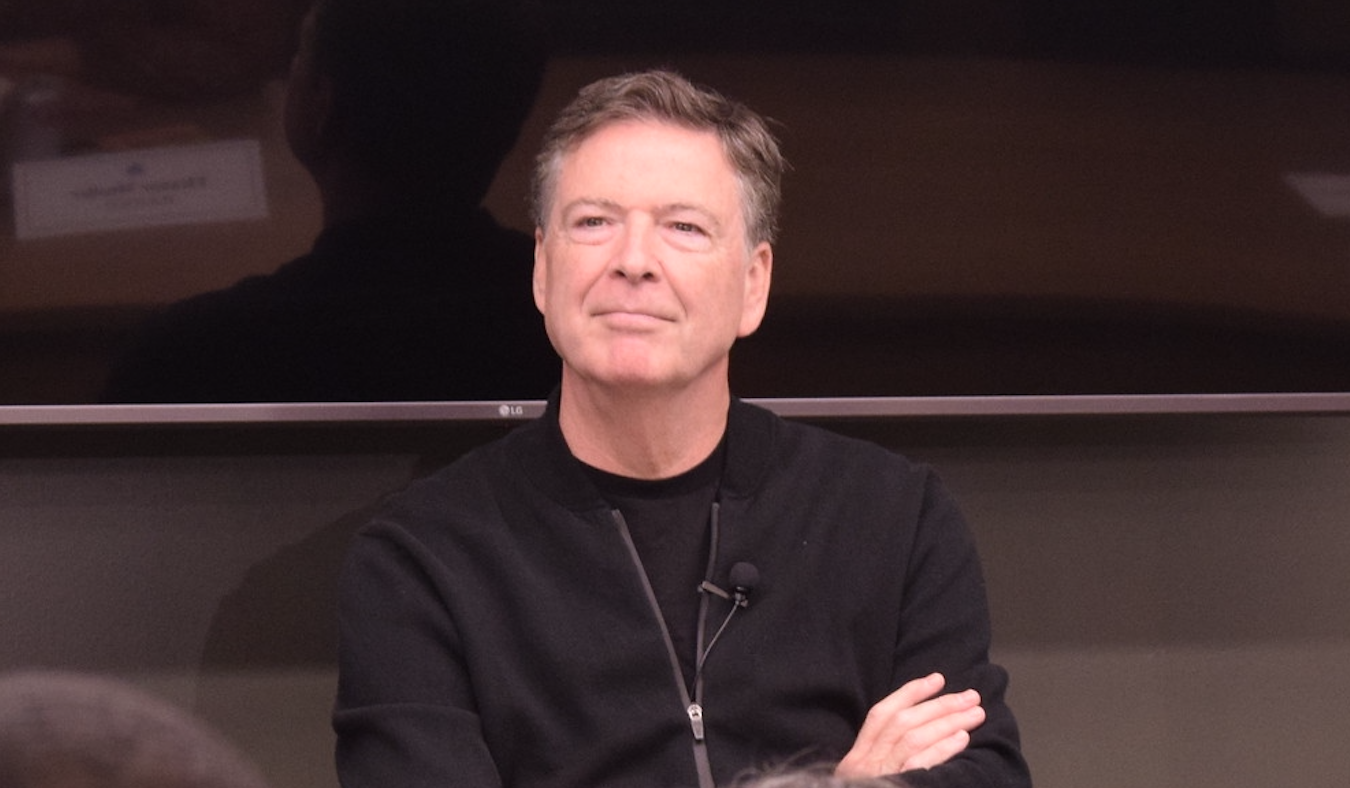
Former FBI Director Jim Comey speaks out on Trump and why he’s still “optimistic about America.”
Former FBI Director Jim Comey has some regrets from a public life often spent in the eye of a hurricane.
But the decision to re-open the contentious inquiry into Hillary Clinton’s use of a private email server days before the 2016 election that ushered in Donald Trump, is not one of them.
Nearly seven years later, Comey — abruptly fired just five months into Trump’s term after disclosing the FBI’s inquiry into Russia’s ties to the former president’s campaign — remains “at peace” with the decision that some assert tilted the election to Trump.
“I’ve thought about the decisions I’ve made, a thousand times is probably not enough,” Comey told the National Press Foundation’s Paul Miller Washington Reporting Fellowship class. “And I’m very proud of the way the decisions were made and I’m comfortable with the decisions even though I see thoughtful people who see it differently, and that’s OK. So, I’m at peace with those decisions… (It) was never my goal to be famous.”
In a wide-ranging discussion, Comey did not mince words about his former boss, saying “it’s really important that he not be president of the United States again.”
He described a personal “frustration” at the Justice Department’s decision not to immediately explain the decision to search Trump’s Mar-a-Lago, Florida resort last year as part of the federal inquiry into the former president’s unlawful retention of classified documents.
When Attorney General Merrick Garland did address that action three days later, Comey said the void had been filled by a stream of conspiracy theories and false depictions of a rogue FBI.
“If I’m going to maintain the faith and confidence of people, I got to show them the work,” Comey said. “It’s the reason I was so frustrated watching the silence that followed the court authorized search warrant at Mar-a-Lago. Three days of silence, except not silence, because a lot of lies were told about the FBI and the Justice Department, yet those organizations were silent.
“And I am not in touch with those leaders, so I don’t know what their thinking was. But I remember thinking from the sideline: ‘You got to get out there. You’ve got to explain to people why you’re doing what you’re doing because in the absence of your voice, that spot is being filled.’”
Among his regrets, Comey cited his handling of a very public fight with Apple Inc., and the FBI’s attempt to gain the tech giant’s assistance in unlocking the encrypted iPhone of an attacker in the 2015 mass shooting in San Bernardino, California.
“I screwed up the public beginning of the encryption debate,” Comey said, adding that the dispute was largely cast as a personal conflict between the FBI director and Apple chief Tim Cook.
“And so that’s an easy narrative for people to follow and to write about instead of what it should have been, which is a much more complex and nuanced and difficult conversation where I share values on both sides of that equation. And so, I totally screwed it up.”
What Comey said on Trump’s new campaign:
“No matter where people are in the political spectrum, if they take the time to think about what it would mean if Donald Trump were president again… people will spend time thinking about that armed with more knowledge about how he could do more to accomplish his retributive goals through places like the military and law enforcement, the intelligence community. So, I think it’s really important that he not be president of the United States again, but that’s a choice for the American people to make.”
On transparency in government:
“I don’t want to be famous. I was never, ever, ever, and still, never, ever, ever going to run for office. I didn’t love a lot of public engagement. There were plenty of days when I was like, ‘Shit, I got to go sit and talk to these (reporters) again.’ And yet I did it even when I didn’t feel like doing it because I think it’s my job. And I used to argue with Bob Mueller, my predecessor about this because he saw it differently than I did. And I would accuse him of being a dinosaur and being old school. …. I still in hindsight think I’m right, that we are best served by people understanding the work, and they can only understand the work if we offer a maximum transparency.”
The case for optimism:
“The justice system at the federal level I think is going to be fine. …. I believe there are quality people leading the United States Department of Justice now, people of character and integrity. I would do things differently in terms of interacting with the public. I think I just made that clear. But these are quality people who care about getting it right, but it’s under attack in a frontal assault like I’ve not seen in my lifetime…
“We never get to where we need to be. We were born in original sin in this country, and we are always falling short of our ideals, but we’re making progress consistently. But if you stare at the line, it’s a jagged line. We make progress, we retreat, we make progress, we retreat. And one of the reasons I’m optimistic about America is I have a… reasonably good understanding of our history and have seen us make tremendous progress long before we were all born and then retreat and then make the progress again and retreat. The cool thing about America is that the subsequent progress always exceeds the retreat that came before, which is why the line has an upward slope. So, I am optimistic about America.”
Access the full transcript here.
The Paul Miller Washington Reporting Fellowship is funded through the National Press Foundation’s Annual Awards Dinner. Reserve your table now.
https://nationalpress.org/topic/james-comey-fbi-director-talks-hillary-clinton-merrick-garland/






